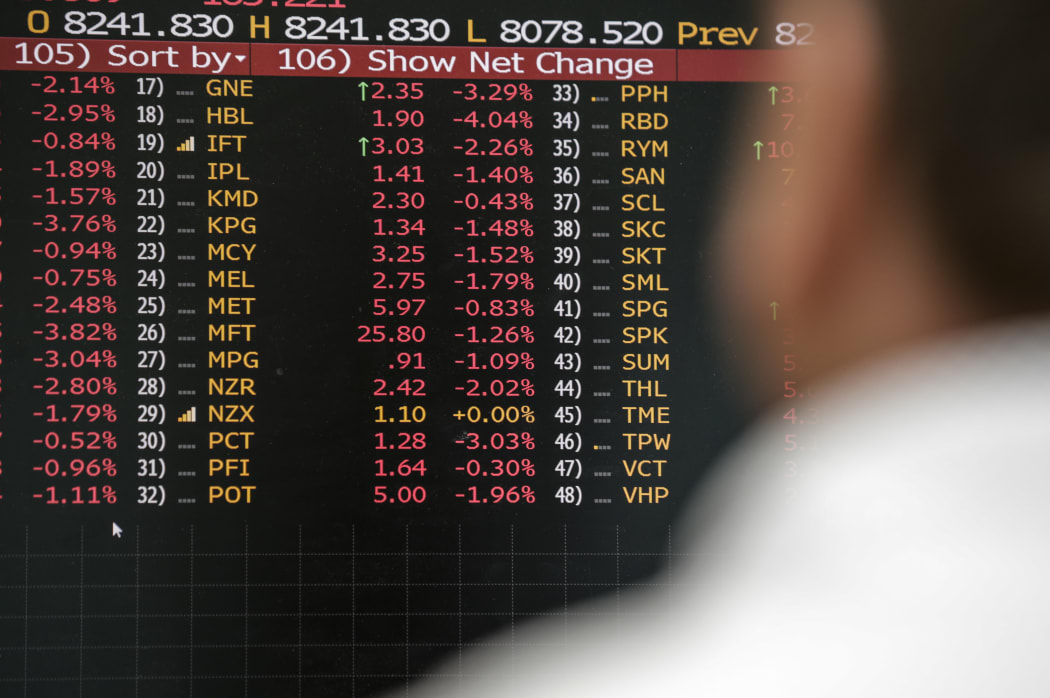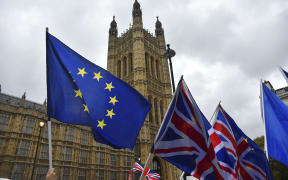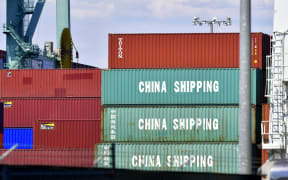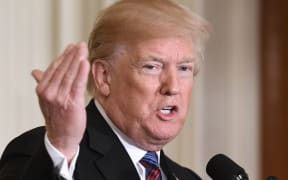New Zealand's sharemarket has posted big losses is having its worst day in nearly two months as a flattening US Treasury yeild curve sparked recession warnings.

New Zealand's share market immediately fell two percent on opening Photo: RNZ / Rebekah Parsons-King
The benchmark top-50 index is down about 1.4 percent as local investors have followed Wall Street's overnight plunge.
United States markets fell more than three percent amid concerns the so-called ceasefire in the US-China trade dispute is unravelling, and the US economy is headed for a slowdown.
Locally only two stocks in the main index have risen, with large falls for leading companies A2 Milk, fast food operator Restaurant Brands, and Fisher and Paykel Healthcare.
In the US, benchmark Treasury 10-year yield fell to its lowest point since mid-September. The spread between the 10-year yield over its two-year counterpart also shrank to the smallest since the start of the financial crisis in January 2008, signaling to some investors an approaching US economic slowdown.
"Today is the perfect storm," said RJ Grant, head of trading at Keefe, Bruyette & Woods in New York. "You've nothing really tangible coming out of the G20 summit. You have worries about growth."
MSCI's gauge of stocks across the globe shed 2.16 percent, its worst performance since October 11.
The Dow Jones Industrial Average fell 799.36 points, or 3.1 percent, to 25,027.07, the S&P 500 lost 90.31 points, or 3.24 percent, to 2,700.06 and the Nasdaq Composite dropped 283.09 points, or 3.8 percent, to 7,158.43.
The New York Stock Exchange and Nasdaq will be closed on Wednesday, for a day of mourning for former President George H.W. Bush, who died on Friday at the age of 94.
The pan-European STOXX 600 index lost 0.76 percent.
On Monday, stock markets around the world got some relief after Washington and Beijing agreed to temporarily end their trade war during talks at the G20 summit in Argentina. Upon closer scrutiny, investors said a deal between the world's two biggest economies was far from a sure bet.
"As soon as investors digested the information from the discussions they focused on the uncertainties and lack of details," said Ryan Nauman, market strategist, Informa Financial Intelligence, Zephyr Cove, Nevada.
There was added confusion over when the 90-day truce period, during which the United States and China would hold off on imposing more tariffs, would start.
Additionally, US President Donald Trump on Tuesday warned he would revert to tariffs if the two sides could not resolve their differences.
"If it is, we will get it done," Trump wrote in a Twitter post. "But if not remember, I am a Tariff Man."
Meanwhile, the flattening US yield curve weighed on investors' minds.
"The focus is now shifting to the inverted US bond yield curve, which has negative connotations, while implying the US economy is heading towards what was, only a few weeks ago, an improbable economic slowdown," said Stephen Innes, head of trading for APAC at Oanda.
Comments on Tuesday by New York Fed President John Williams about the path of interest rate hikes added to the uncertainty for investors.
Williams said the US central bank should expect to continue raising interest rates "over the next year or so" even while it pays close attention to possible risks highlighted by financial markets.
The comments came after those from Fed chair Jerome Powell last week, which lifted stocks as they were interpreted as suggesting a less aggressive path of rate hikes.
The dollar, which started the week on a weak footing as the apparent thaw in trade tensions between the US and China cooled demand for the safe-haven currency, extended its fall as investors worried about the inversion of the short end of the US yield curve in bond markets.
Sterling briefly drooped to a 17-month low on the day, before recovering ground to trade little-changed, in a volatile session dominated by Brexit-related headlines.
Oil prices pared some gains as fears flared that demand would stall due to a trade war between the US and China, and that Russia remained a stumbling block to a deal to cut global crude supply.
Brent crude oil settled at $US62.08 per barrel, or jumped up 0.63 percent. US light crude was last up 30 cents at $US53.25.




